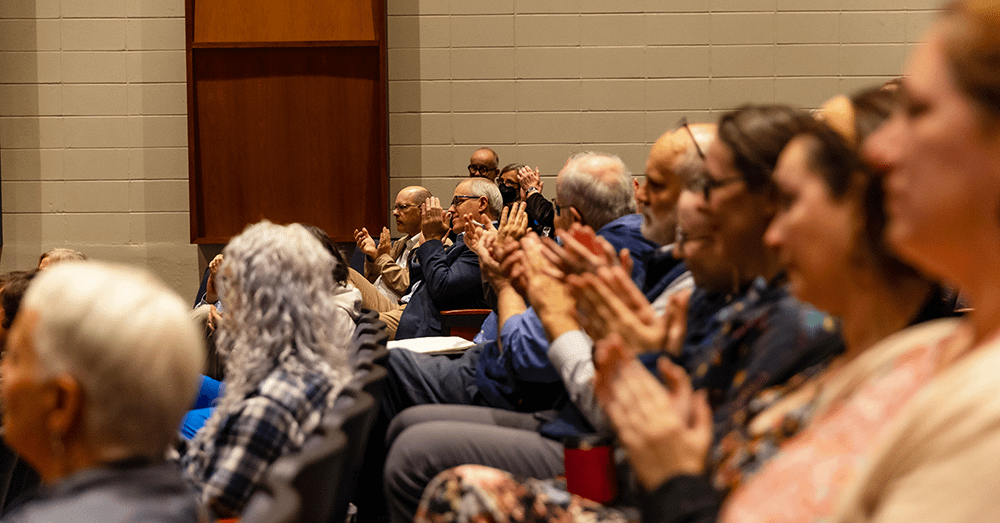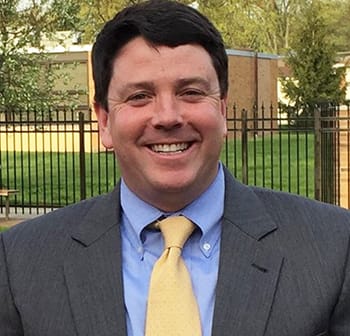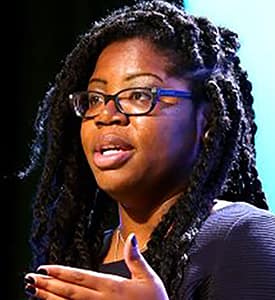Later-week MLK film, panel stir vital exchanges
'American Son" screening is impetus for frank exchanges on race
The prevalence of racism and prejudice in our society has called for opportunities to discuss the intricacies of inequality in depth, and at the McCarthy Arts Center the evening of January 21, such an opportunity arose with the screening of the Netflix Original film, American Son, for the Saint Michael’s College campus community. The film paints a picture of the complexities of racism and its societal reverberations.
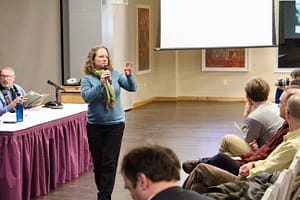
Patti Delaney of the College’s anthropology faculty makes a point during Wednesday’s discussion in the Roy Room. All photos by Max Rossignol ’22.
McCarthy’s Recital Hall was filled to capacity on Tuesday night as students and faculty alike gauged a willingness to learn about the implications of racism and the day-to-day damage that it has inflicted upon our society. As the crowd settled and attention shifted toward the stage, co-president of the Martin Luther King Jr. Society, Kayla Erb ’22, commenced the event with a brief introduction of the film and an expression of gratitude to the crowd for their willingness to engage in learning about the complexities of racism.
The film opened with a quotation from Ta-Nehisi Coates, an African American author noted for his work in addressing these intricacies on a personal note and on a larger scale. Coates writes, “Race is the child of racism. Not the father.” After the appearance of this statement, one could hear a pin drop as the recital hall became powerfully silent and attentiveness levels were heightened.
American Son is based on a Broadway play that tells the story of a mother and her black, missing teenage son. Kendra Ellis-Connor, the main character of the film, had struggled to maintain her composure at a Miami police station after the disappearance of her son, Jamal. Shortly after she traveled to the police station to search for answers, Ellis-Connor and her estranged, white husband had reunited for the sake of their son. As they both waited to receive information about Jamal’s disappearance, the pair engaged in a multiplex conversation about the interracial identity conflicts Jamal had faced during his adolescence. Ellis-Connor also expressed much conflict experienced herself as a black mother living in a structurally racist society.
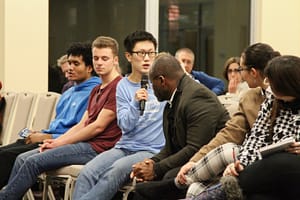
A student speaks during Wednesday’s discussion as Moise St. Louis beside him listens.
The film additionally disclosed issues of police brutality against the black community, as Jamal had tragically faced these implications himself. As the film approached its ending, students and faculty were preoccupied a plethora of questions. The rest of the night was used as a time of reflection, and the group reconvened the following night for a panel discussion of American Son.
On Wednesday, January 22, the “Panel on American Son & The Impact of Stereotypes and Prejudice” was held in the Roy Room of the Dion Student Center at 7 p.m. The panelists for the night included Professors Patrick Standen, Robert Brennenman, Patricia Delaney, and Doug Babcock of Public Safety.
Erb ’22 initiated a brief panel introduction and an expression of gratitude to the crowd for their attendance at the film and attentiveness to the pertinent issues of racism on and off campus.
The panel began with a “turn and talk” activity commenced by Professor Delaney, in which students were given the opportunity to provide insights with peers and discuss provocative messages that resonated with them. Delaney stated that the purpose of this activity had been rooted in a desire for the panel to receive feedback in order to lead a conducive
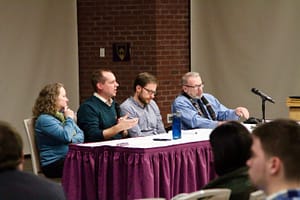
The panelists engage with the audience.
conversation about reactions and discernments of the film. Preceding this exercise was the opportunity for students to vocalize their responses to the panelists and attendees.
Each panelist provided individual perspectives about the film and honed their insights into the understanding of racism. Professor Brenneman, a sociology professor at the College, stated, “My understanding of my own whiteness, and my friends’ understanding of their own blackness, and my wife’s understanding of her own ‘Hispanicness’ is shaped by racism [and] by interactions that are steeped in racism. The ways in which we understand our own identities are shaped by racism.” It has shaped the way we view ourselves and others in the perceptual context of identity, he said.
Doug Babcock of Public Safety delved into the legalities of bias present in campus security or police forces, noting the structural barriers in place. He stated, “We need to look at the institutions that bring racism and bias as the cause and where the work needs to be done, acknowledging that they need to be changed and work on how each human is able to interact in that moment.” Connecting institutional racism to the modern day approaches in policing, Babcock stated, “Police officers are taught de-escalation techniques now more than 18 years ago. There is a much more prominent role in this training.”

A student rises to join the discussion with the panel.
However, stereotypes and biases are more than structural, as they are carried by all people, argued philosophy Professor Standen. He stated, “Each one of you is carrying all kinds of stereotypes as I am, and the difficult thing is to own that and to own our histories, recognizing that we need to learn how to undo those histories. The privileges that we each have being here is that we have to account for and decide where they come from.” Standen continued with a discussion of how the film allows us the opportunity to delve into these histories and traditions with a retrospective view.
As the panel approached a close, Delaney offered a personal discernment, viewing the film as an anthropologist, a woman, and a mother. “The last thing I’ll say about this film is that it holds me to have this conversation and engage deeply with all of our identities, all of our intersectionality, and with our shared desire to be part of what Dr. King referred to as the ‘beloved community.’ It’s hard and we have a lot of work to do. It’s both structural and personal.”
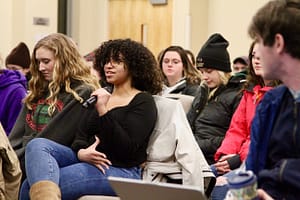
The author of this piece, Ashley DeLeon ’23, center, at Wednesday’s discussion.
As racism has played a large role in our social and systemic history, it is vital that our campus community continues to stand together against racism and work towards inclusivity for all, according to the panelists, organizers, and attendees, who demonstrated the first steps in working towards change: acknowledgement and understanding. As Martin Luther King Jr. once said, “Our lives begin to end the day we become silent about things that matter.” With MLK month coming to an end, this student-participant and reporter on the week’s events believes we must maintain our energy and efforts to promote racial justice, as silence is a detriment to an effort that thrives on voice.


